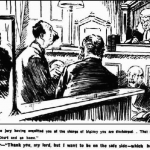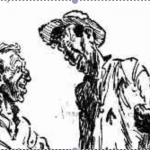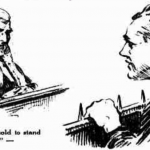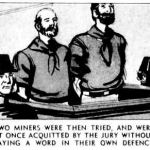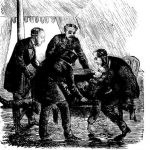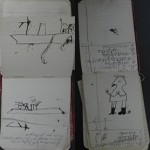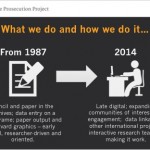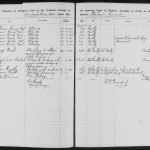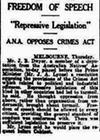Research Brief 10 For the past several weeks, radio listeners who tune in to the drive-time programme of comedians Dave Hughes and Kate Langbroek have been enthralled by the unfolding saga of Barb and Niko. Barb is Langbroek’s online alter-ego, whose dating profile – depicting her as a rich middle-aged widow – was designed […]
Category Archives: Research briefs
Speaking positions
Research Brief 9 In April 1905, elderly Henry Ayling appeared before Judge Burnside and a jury of 12 peers in the Perth Criminal Court on a charge of bigamy. The key question during the trial centred on the validity of Henry’s first marriage, alleged to have occurred in Adelaide in 1877 almost 30 years […]
Swearing children: The nature of an oath
Research Brief 8 For the adversarial trial, the oath symbolizes the ascertainment of truth. Truth is emphasized in the witness swearing to tell the truth, the whole truth and nothing but the truth. Historically, the swearing of an oath by a witness at trial had a number of significant implications. Those who were foresworn […]
Juries mediating justice
Research Brief 7 Although most people envision the jury’s role as simply determining the guilt or innocence of a defendant, the outcome of a jury trial can actually be much more complex. Factors surrounding the trial and the defendant’s actions can lead to less straightforward verdicts which do not necessarily indicate whether the accused […]
No mercy for a would-be assassin
Research Brief 6 ‘In the end’, says Australia’s Prime Minister appealing to the Indonesian government for clemency for Australian drug smugglers facing a firing squad, ‘mercy has to be a part of every justice system’. The sentiment is noble. Mercy has been a prerogative of sovereigns and of the democratic governments that have succeeded […]
Christmas, crime and spirits
Research Brief 5 The festive period may be the season of good will, but this annual spirit of benevolence is not particularly apparent from the annals of criminal history. While court business is suspended across the holidays, crime is decidedly not. Just like the rest of the year, a variety of offences against property, […]
Unearthing criminal pasts
Research Brief 4 For those infected with the historical research bug, there are few more satisfying experiences than delving into the original records held in private, national or state archives. Almost every researcher I have encountered at such institutions – be they family, local or academic historians – insist that it is this treasure-hunting […]
What makes a digital project digital?
Research Brief 3 eResearch Australasia 2014 has just been held in Melbourne. This is the conference that brings together people involved in doing and supporting digital research. The use of digital technology of course is now so much a part of research work that a plenary on the first day considered whether the ‘e’ […]
Uttering, not littering
Research Brief 2 Learning to decipher the handwritten criminal registers being used to construct the Prosecution Project’s database can be like learning another language. Over time the initially illegible appearance of nineteenth-century scrawl becomes more familiar. Those who work regularly with archival documents gradually learn the secrets of decoding the idiosyncrasies of historic handwriting; […]
Not another centenary?
Research Brief 1 In a world full of centenaries (outbreak of World War 1914, the prelude to Gallipoli next year, the Armistice of 1918 and the Versailles Conference of 1919) there are some that understandably escape attention. One of these is Australia’s Crimes Act of 1914. This was the founding statute of Commonwealth criminal […]

